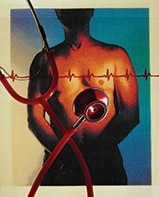Cardiovascular disease, cholesterol and statin drugs
The pivotal role of elevated blood cholesterol in the pathogenesis of cardiovascular disease has been established over a long period. Advances in our knowledge of cell biology and biochemistry have led to the discovery and now widespread use of statin drugs. Statins inhibit the rate-limiting step in cholesterol biosynthesis thereby initiating a series of reactions that lower levels of serum cholesterol, or more specifically LDL cholesterol.
Randomised, placebo-controlled trials have clearly demonstrated that statins prevent heart disease and stroke in patients with and without a history of cardiovascular disease (see the box on page 49). The recent UK Heart Prevention Study has created new interest by showing that statins prevent cardiovascular disease in high risk patients with baseline cholesterol readings as low as 3.5 mmol/L. This is a far cry from a few years back when cholesterol levels were regarded as probably deserving treatment only when they were greater than 6.5 mmol/L.

